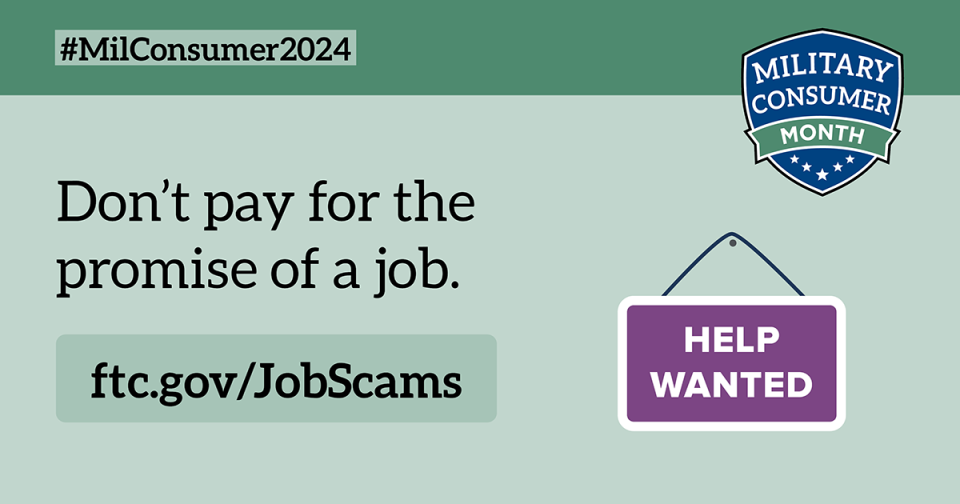You might be a spouse who’s PCS’d to a new location or a servicemember getting ready to retire — and you’re probably eyeing new career possibilities. You know where to look for a job, but do you know how to recognize the signs of a job scam?
Know that scammers advertise jobs and business opportunities online in ads, on job sites, and on social media.
- Are they asking you to pay for a job? Honest employers, including the federal government, will never ask you to pay to get a job. Anyone who does is a scammer. Honest employers also will never send you a check and then tell you to send them part of the money. That’s a fake check scam.
- What do you know about them? Search online for the name of the company or the person who’s hiring you, plus the words “scam,” “review,” or “complaint.” You might find out they’ve scammed other people.
- Are those reviews real? Success stories and testimonials might not be true or typical. Glowing stories of success could be fake or misleading, and positive online reviews may have come from made-up profiles.
- What does a trusted friend or loved one think about the offer? Take some time to talk to someone you trust about ads for jobs or business opportunity offers. And learn more at ftc.gov/jobscams.


As a former recruiter, I give out advice about NOT PAYING for a job all the time. Then, someone will call and ask how much I charge. I explain that the jobs we have (had) are paid by the hiring company not the potential employee. Then that same person will call back to ask where they are to send the check. Sometimes you are not able to help someone.
We almost got scammed with the fake check scam where they ask you to send a percentage on to the next person. Fortunately, our spidey senses kicked in and we stopped the Western Union transaction and the check they told us to deposit. We were too desperate for a cash influx with my wife out of work and the scammers prey on those of us who are vulnerable. The scammers send out thousands of these scam offers and only a few of them have to work to make the scam profitable for the scammers. Be careful people, especially watch out for our elderly parents.We almost got scammed with the fake check scam were they ask you to send a percentage on to the next person. Fortunatly our spidey senses kicked in and we stoped the Western Union transaction and the check they told us to deposit. We were to desperate for a cash influx with my wife outa work and the scammers prey on those of us who are vonerable. The scammers send out thousands of these scam offers and only a few of them have to work to make the scam profitable for the scammers. Be careful people, especially watch our elderly parents.
Thank you for this advice!
There is a new scam using Microsoft Teams to communicate. It's on Facebook and or they send you an email. Then they ask you to contact them through Teams to interview.
I'm happy to have come across this article. As of late I've been getting texts asking me if I want/ need a job.
It's always deleted because I'm retired now and am so far, Content. The thought crossed my mind about whether or not it was a scam because I'm not registered with any Temp. AGENCY.
Anyway, it's all together now.
Thank You so much!! Maybe they'll stop trying to find out if I have a secondary insurance by texting me.
Shouldn't they know if I do because they claim to be my Primary Insurance???? 🫣